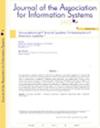理解在线健康社区的参与:基于信任的视角
IF 5.5
3区 管理学
Q1 COMPUTER SCIENCE, INFORMATION SYSTEMS
引用次数: 3
摘要
在线卫生社区(OHCs)为那些寻求卫生信息、支持或建议的人提供了一种受欢迎和有价值的资源。它们有可能减少对传统卫生信息渠道的依赖,提高卫生知识普及程度,并在卫生管理决策方面赋予更广泛的个人权力。成功的社区的特点是对用户贡献的高度信任,这反映在参与的增加上,并通过知识的采用和知识的贡献来表达。然而,研究表明,大多数OHCs由被动的参与者组成,他们不通过员额作出贡献,从而威胁到许多社区的可持续性及其赋予权力的潜力。尽管如此,信任与敬业度之间的关系,特别是影响OHC社区背景下敬业度的信任前因,在过去的研究中并没有得到充分的解释。在这项研究中,我们利用社会资本行为和社会交换理论框架,以提供一个更细致的基于信任的因素,影响个人在ohc中的参与。我们收集了410名巴西Facebook ohc参与者的数据,并使用偏最小二乘法对研究模型进行了测试。研究结果证实,在线社区响应和社区支持这两个新结构是影响OHCs参与的信任前因,从而导致知识采纳和知识贡献反应。这些发现有助于信任和参与文献以及社交媒体研究知识。从从业者的角度来看,研究结果可以为寻求发展可信和有影响力的ohc的调节者和管理者提供重要指导。本文章由计算机程序翻译,如有差异,请以英文原文为准。
Understanding Engagement in Online Health Communities: A Trust-Based Perspective
Online health communities (OHCs) represent a popular and valuable resource for those seeking health information, support, or advice. They have the potential to reduce dependency on traditional health information channels, increase health literacy and empower a broader range of individuals in relation to their health management decisions. Successful communities are characterized by high levels of trust in user-generated contributions, which is reflected in increased engagement and expressed through knowledge adoption and knowledge contribution. However, research shows that the majority of OHCs are composed of passive participants who do not contribute via posts, thereby threatening the sustainability of many communities and their potential for empowerment. Despite this fact, the relationship between trust and engagement, specifically the trust antecedents that influence engagement in the OHC community context has not been adequately explained in past research. In this study, we leverage social capital behavior and social exchange theory frameworks in order to provide a more granular trust-based elucidation of the factors that influence individuals’ engagement in OHCs. We collected data from 410 Brazilian participants of Facebook OHCs and tested the research model using partial least squares. The results confirm two new constructs—online community responsiveness and community support—as trust antecedents that influence engagement in OHCs, resulting in knowledge adoption and knowledge contribution responses. These findings contribute to the trust and engagement literatures and to social media research knowledge. From a practitioner perspective, the study findings can serve as an important guide for moderators and managers seeking to develop trusted and impactful OHCs.
求助全文
通过发布文献求助,成功后即可免费获取论文全文。
去求助
来源期刊

Journal of the Association for Information Systems
工程技术-计算机:信息系统
CiteScore
11.20
自引率
5.20%
发文量
33
审稿时长
>12 weeks
期刊介绍:
The Journal of the Association for Information Systems (JAIS), the flagship journal of the Association for Information Systems, publishes the highest quality scholarship in the field of information systems. It is inclusive in topics, level and unit of analysis, theory, method and philosophical and research approach, reflecting all aspects of Information Systems globally. The Journal promotes innovative, interesting and rigorously developed conceptual and empirical contributions and encourages theory based multi- or inter-disciplinary research.
 求助内容:
求助内容: 应助结果提醒方式:
应助结果提醒方式:


